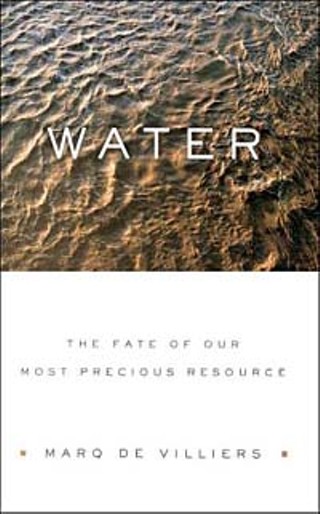By the Book
Recent Fiction and Nonfiction Reviewed
By Erica C. Barnett, Fri., Aug. 18, 2000

Water: The Fate of Our Most Precious Resource
by Marq de VilliersHoughton Mifflin, 288 pp., $26
In Texas, the question of where the water is going to come from is never too far below the surface. True, we build massive dam systems to channel a seemingly endless supply of river water to our major cities, and tap aquifers that until recently seemed as bottomless as the ocean itself, but beneath the calm assurance that the water will never run out is this fact: Unlike trees, cattle, and other products of modern agriculture, water is not a renewable resource. Like petroleum, coal, and diamonds, water exists in finite, if stable, quantities. The population, however -- of the world and of our drought-ridden state -- continues to expand.
The story of water and its (mis)uses is told both elegantly and exhaustively by Marq de Villiers in the aptly titled Water, a book big enough and smart enough to be the final word on the subject. It won't be, of course: The story of water, "our most precious resource," is constantly evolving, as human ingenuity triumphs again and again in its ages-old battle against nature and the constraints imposed by scarcity.
Water, to be sure, is a huge yet highly arcane topic. It (or its scarcity) has incited battles between neighbors, uprooted entire populations, and allowed desert nations (including parts of the Western United States) to flourish where nothing had taken root before. Water, which reads more like a travel diary than the exhaustive ecological and scientific survey it is, details a few of the world's water conflicts and hydrological miracles, sandwiching an astonishing amount of information about river systems, seething international tensions, and irrigation methods -- to name a tiny few -- into a seamless, highly literary narrative.
De Villiers travels from the dying Okivango Delta in Africa, where his story begins, to the magnificent, retreating glaciers of Newfoundland, to the desert-swathed wasteland of Timbuktu. Everywhere, he finds reason for hope and much despair. In Israel, where improbable citrus groves have sprung from the intractable East Mediterranean desert, tensions over water rights have increased as the nation's water overdrafts have topped 15% a year. Along the Volga River, the longest waterway in Europe and one of Russia's most revered, chemical factories have poured millions of tons of runoff into the water, eradicating all traces of plant and aquatic life and turning the air acrid, yellow, and foul.
"There is no 'them' doing all this," de Villiers writes. "We're all at fault. It's the nature of our civilization." By damming rivers so that they no longer flow to the sea, tapping aquifers faster than they can be recharged, using wasteful irrigation methods to grow cash crops in the desert, and building cities where water is scarce, we have, de Villiers asserts, set ourselves up for disaster. But de Villiers is no alarmist, and Water is no propagandistic harbinger of doom. After building an exhaustive and thoroughly convincing case against the water-management methods currently in practice, de Villiers suggests several options that could help preserve enough water to sustainably serve humankind well into the future. None will be painless or easy -- controlling population growth is one of the more plausible options -- but all are better than the alternative: letting water use continue to balloon, boosting the scarcity and the value of a commodity we simultaneously take for granted and cannot live without.








